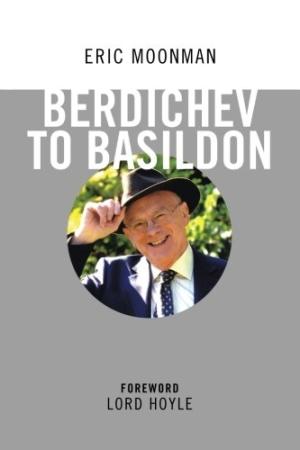Berdichev to Basildon
Berdichev to Basildon shines at detailing a rough-and-tumble career in British politics.
A political junkie’s dream, Berdichev to Basildon by Eric Moonman is an informal firsthand account of life in politics and public service in the United Kingdom.
From Moonman’s humble roots in the Ukraine to his multiple terms as House of Commons representative of Great Britain’s most populous district, Basildon, the memoir is replete with anecdotes and observations about the UK political environment from the 1950s to the twenty-first century.
The narrative proceeds in a straight chronological line, beginning with the author’s father in the Jewish community of Berdichev, Ukraine, and his immigration to Liverpool in the early years of the twentieth century. Writing is conversational and accessible, even lighthearted in places, though it does not minimize encounters with issues still current today, including health care, abortion, and the Middle East.
The relatively brief work packs a great deal of experience into few words; at the end, fascinated audiences may wish that it were longer and more in depth. For instance, it conveys much of the author’s childhood experiences of living through the Blitz—the Nazi bombing of London in World War II—in just a few paragraphs. That brevity, while making the book a fast read, necessarily scrimps on some descriptions of events and characters, especially those influencing Moonman’s early life.
The book contains more detail about the author’s political career, and this is where Berdichev to Basildon shines. Moonman’s accounts of trying to get increased funding for public health care—“chairs were thrown, fists flew”—and other issues are compelling, even funny at times. He includes observations about his fellow MPs, who, even away from Parliament, speak only of “plots and plotting.”
Moonman’s encounters with world leaders and celebrities are also covered, featuring observations on Prime Minister Harold Wilson and his sharp sense of political humor; Princess Diana, who was “all you could wish for as a ‘boss’”; and Yasser Arafat, with whom a “meeting was not constructive.”
Just as interesting are Moonman’s accounts of interactions with ordinary constituents, including a woman who, in 1967, wanted Moonman to get her twelve-thousand-pound heating bill forgiven. Such anecdotes bring the story to life.
Pages are filled with accounts of the rough-and-tumble nature of British politics, including winning and losing elections, dealing with the demands of constituents, and the fact that in politics, you can’t please everybody all the time. However, Berdichev to Basildon should please most politically-minded audiences.
Reviewed by
Gary Henry
Disclosure: This article is not an endorsement, but a review. The publisher of this book provided free copies of the book and paid a small fee to have their book reviewed by a professional reviewer. Foreword Reviews and Clarion Reviews make no guarantee that the publisher will receive a positive review. Foreword Magazine, Inc. is disclosing this in accordance with the Federal Trade Commission’s 16 CFR, Part 255.

